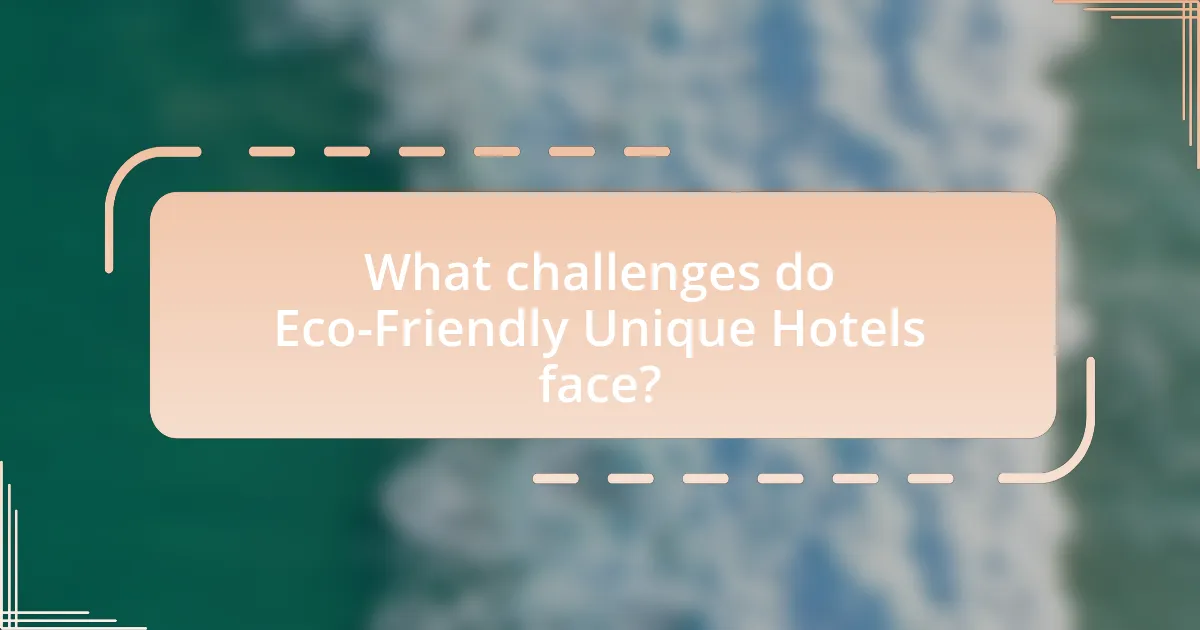Eco-friendly unique hotels are accommodations designed to minimize environmental impact while providing distinctive experiences through sustainable practices. These hotels differ from traditional ones by prioritizing renewable energy, water conservation, and local sourcing, contributing to reduced carbon footprints and enhanced guest experiences. Common sustainable practices include energy-efficient systems, waste reduction programs, and innovative architectural designs that reflect local culture. The growing popularity of these hotels is driven by increasing consumer demand for sustainable travel options, with travelers benefiting from eco-friendly practices that align with their values. Various types of eco-friendly hotels, such as treehouses and underwater hotels, exemplify innovative approaches to sustainable tourism while facing challenges like high operational costs and regulatory compliance.

What are Eco-Friendly Unique Hotels?
Eco-friendly unique hotels are accommodations designed to minimize environmental impact while offering distinctive experiences. These hotels often utilize sustainable practices such as renewable energy sources, water conservation systems, and eco-friendly materials in their construction and operations. For instance, many eco-friendly hotels incorporate local and organic food sourcing, promote biodiversity through landscaping, and engage in community-based tourism initiatives. The Global Sustainable Tourism Council (GSTC) recognizes these practices as essential for reducing carbon footprints and enhancing guest experiences, thereby validating the importance of eco-friendly unique hotels in the hospitality industry.
How do Eco-Friendly Unique Hotels differ from traditional hotels?
Eco-Friendly Unique Hotels differ from traditional hotels primarily in their commitment to sustainability and environmental responsibility. These hotels often utilize renewable energy sources, implement water conservation practices, and prioritize the use of locally sourced materials and organic products. For instance, many eco-friendly hotels are designed with energy-efficient systems, such as solar panels and green roofs, which significantly reduce their carbon footprint compared to conventional hotels that typically rely on non-renewable energy sources. Additionally, eco-friendly hotels often engage in community-based initiatives, supporting local economies and promoting cultural heritage, which contrasts with the more standardized and less personalized approach of traditional hotels.
What sustainable practices are commonly implemented in these hotels?
Sustainable practices commonly implemented in eco-friendly hotels include energy-efficient lighting, water conservation systems, and waste reduction programs. Many hotels utilize LED lighting to reduce energy consumption, which can lower electricity usage by up to 75%. Water-saving fixtures, such as low-flow showerheads and toilets, help minimize water waste, often achieving reductions of 30% or more in water usage. Additionally, waste reduction initiatives, such as recycling programs and composting organic waste, are frequently adopted, with some hotels reporting a diversion of over 50% of their waste from landfills. These practices not only contribute to environmental sustainability but also enhance the overall guest experience by promoting responsible tourism.
How do design and architecture contribute to their uniqueness?
Design and architecture contribute to the uniqueness of eco-friendly hotels by integrating sustainable materials and innovative layouts that reflect local culture and environment. For instance, the use of reclaimed wood, green roofs, and energy-efficient systems not only minimizes environmental impact but also creates distinctive aesthetics that differentiate these hotels from conventional accommodations. Additionally, architectural features such as natural lighting, open spaces, and biophilic design enhance guest experiences while promoting sustainability. This approach is supported by studies indicating that hotels incorporating eco-friendly design elements can achieve higher guest satisfaction and loyalty, as seen in the 2020 report by the Global Sustainable Tourism Council, which highlights the growing consumer preference for environmentally responsible travel options.
Why are Eco-Friendly Unique Hotels gaining popularity?
Eco-Friendly Unique Hotels are gaining popularity due to the increasing consumer demand for sustainable travel options. Travelers are becoming more environmentally conscious, seeking accommodations that minimize their ecological footprint. According to a 2021 survey by Booking.com, 81% of global travelers expressed a desire to stay in eco-friendly accommodations, highlighting a significant shift towards sustainability in the hospitality industry. This trend is further supported by the rise of social media, where unique and visually appealing eco-friendly hotels attract attention and inspire travelers to choose sustainable options.
What trends are driving the demand for sustainable accommodations?
The demand for sustainable accommodations is primarily driven by increasing consumer awareness of environmental issues. Travelers are increasingly prioritizing eco-friendly practices, such as energy efficiency, waste reduction, and sustainable sourcing, when choosing where to stay. According to a 2021 survey by Booking.com, 81% of global travelers indicated that they want to stay in eco-friendly accommodations, reflecting a significant shift towards sustainability in travel preferences. Additionally, government regulations and incentives promoting green practices in the hospitality industry further contribute to this trend, encouraging hotels to adopt sustainable measures to attract environmentally conscious guests.
How do travelers benefit from choosing these hotels?
Travelers benefit from choosing eco-friendly unique hotels by enjoying sustainable accommodations that minimize environmental impact while providing distinctive experiences. These hotels often utilize renewable energy sources, reduce waste through recycling programs, and support local communities, which enhances the travel experience by aligning with the values of environmentally conscious guests. For instance, a study by Booking.com in 2021 found that 81% of travelers believe that staying in eco-friendly accommodations is important, indicating a growing preference for sustainability in travel choices.

What types of Eco-Friendly Unique Hotels exist?
Eco-friendly unique hotels include treehouses, underwater hotels, converted shipping containers, and eco-lodges. Treehouses offer a natural experience elevated among the trees, while underwater hotels provide a unique aquatic environment, allowing guests to observe marine life. Converted shipping containers are sustainable and innovative, repurposing materials for lodging. Eco-lodges focus on sustainability, often utilizing renewable energy sources and local materials, promoting conservation and community engagement. These types of hotels cater to environmentally conscious travelers seeking distinctive accommodations.
What are some examples of unique eco-friendly hotel concepts?
Unique eco-friendly hotel concepts include treehouse hotels, underwater hotels, and ice hotels. Treehouse hotels, such as those found in Costa Rica, utilize natural materials and are built high in the canopy, minimizing land disturbance and providing a unique experience. Underwater hotels, like the Poseidon Undersea Resort in Fiji, offer guests the chance to stay submerged in the ocean, promoting marine conservation and awareness. Ice hotels, such as the Icehotel in Sweden, are constructed from ice and snow, using renewable resources and melting away naturally each spring, thus leaving no permanent footprint. These concepts exemplify innovative approaches to sustainable tourism while providing distinctive guest experiences.
How do treehouses and yurts provide sustainable lodging options?
Treehouses and yurts provide sustainable lodging options by utilizing natural materials and minimizing environmental impact. Treehouses are often constructed using locally sourced wood, which reduces transportation emissions and supports local economies. Yurts, traditionally made from felt and wood, are designed to be energy-efficient and can be easily disassembled and relocated, minimizing land disturbance. Both types of structures often incorporate renewable energy sources, such as solar panels, and promote eco-friendly practices like rainwater harvesting. These features contribute to a lower carbon footprint compared to conventional hotels, making them a viable choice for environmentally conscious travelers.
What role do boutique hotels play in eco-tourism?
Boutique hotels play a significant role in eco-tourism by promoting sustainable practices and enhancing local culture. These hotels often prioritize environmentally friendly operations, such as using renewable energy sources, implementing water conservation measures, and sourcing local, organic food. For instance, a study by the Global Sustainable Tourism Council highlights that boutique hotels frequently engage in community-based initiatives, which support local economies and preserve cultural heritage. This commitment to sustainability not only attracts eco-conscious travelers but also sets a standard for responsible tourism practices within the hospitality industry.
How do location and environment influence hotel sustainability?
Location and environment significantly influence hotel sustainability by determining resource availability and ecological impact. Hotels situated in areas with abundant natural resources can utilize renewable energy sources, such as solar or wind power, which reduces their carbon footprint. For instance, a hotel located in a sunny region can implement solar panels, leading to lower energy costs and reduced reliance on fossil fuels. Additionally, the surrounding environment affects waste management practices; hotels near urban centers may have better access to recycling facilities, while those in remote areas might need to develop their own sustainable waste solutions. Furthermore, local biodiversity can guide hotels in adopting eco-friendly practices that protect native species and habitats, enhancing their sustainability efforts.
What are the benefits of hotels located in natural settings?
Hotels located in natural settings offer numerous benefits, including enhanced relaxation, improved mental health, and a unique connection to the environment. The serene surroundings of nature contribute to reduced stress levels, as studies indicate that exposure to natural landscapes can lower cortisol levels and promote feelings of well-being. Additionally, these hotels often emphasize sustainability, utilizing eco-friendly practices that appeal to environmentally conscious travelers. Research shows that staying in natural settings can lead to increased physical activity, as guests are more likely to engage in outdoor activities such as hiking and biking. Overall, hotels in natural environments provide a holistic experience that fosters both physical and mental rejuvenation while supporting sustainable tourism practices.
How do urban eco-hotels contribute to city sustainability?
Urban eco-hotels contribute to city sustainability by implementing environmentally friendly practices that reduce resource consumption and promote conservation. These hotels often utilize renewable energy sources, such as solar panels, to minimize their carbon footprint, and they typically incorporate water-saving technologies, like low-flow fixtures, to conserve water resources. Additionally, urban eco-hotels frequently source food locally, which supports local economies and reduces transportation emissions. According to a study by the Global Sustainable Tourism Council, eco-hotels can reduce energy consumption by up to 30% compared to traditional hotels, demonstrating their significant impact on urban sustainability efforts.

What challenges do Eco-Friendly Unique Hotels face?
Eco-friendly unique hotels face significant challenges, primarily related to high operational costs and market competition. The implementation of sustainable practices often requires substantial initial investments in renewable energy sources, eco-friendly materials, and waste management systems, which can strain financial resources. Additionally, these hotels compete with traditional accommodations that may offer lower prices and fewer sustainability commitments, making it difficult to attract price-sensitive customers. According to a study by the Global Sustainable Tourism Council, 70% of travelers prioritize cost over sustainability, highlighting the market challenge for eco-friendly hotels.
What are the common obstacles in maintaining sustainability?
Common obstacles in maintaining sustainability include financial constraints, lack of consumer awareness, and regulatory challenges. Financial constraints often hinder eco-friendly initiatives due to high upfront costs associated with sustainable technologies and practices. For instance, a study by the International Institute for Environment and Development found that many small hotels struggle to invest in energy-efficient systems due to limited budgets. Lack of consumer awareness can also impede sustainability efforts, as guests may prioritize cost over eco-friendly options, leading to insufficient demand for sustainable practices. Additionally, regulatory challenges, such as inconsistent environmental policies and lack of incentives, can create barriers for hotels attempting to implement sustainable practices effectively.
How do financial constraints impact eco-friendly initiatives?
Financial constraints significantly hinder eco-friendly initiatives by limiting the resources available for sustainable practices. When hotels face budget restrictions, they often prioritize immediate financial returns over long-term investments in green technologies or sustainable materials. For instance, a study by the International Journal of Hospitality Management found that hotels with limited budgets are less likely to implement energy-efficient systems, which can lead to higher operational costs in the long run. Additionally, financial limitations can restrict access to grants or funding opportunities aimed at promoting sustainability, further exacerbating the challenge of adopting eco-friendly practices.
What regulatory challenges do these hotels encounter?
Eco-friendly unique hotels encounter regulatory challenges primarily related to compliance with environmental standards and local zoning laws. These hotels must adhere to strict regulations regarding waste management, energy efficiency, and water usage, which can vary significantly by region. For instance, in many jurisdictions, hotels are required to obtain certifications such as LEED (Leadership in Energy and Environmental Design) to validate their sustainable practices. Additionally, local zoning laws may restrict the types of structures that can be built or renovated, impacting the design and operation of these hotels. Failure to comply with these regulations can result in fines, legal issues, or even closure, underscoring the importance of navigating the complex regulatory landscape effectively.
How can Eco-Friendly Unique Hotels improve their sustainability efforts?
Eco-Friendly Unique Hotels can improve their sustainability efforts by implementing renewable energy sources, such as solar panels and wind turbines, to reduce reliance on fossil fuels. Utilizing renewable energy not only decreases greenhouse gas emissions but also lowers operational costs over time. For instance, a study by the U.S. Department of Energy found that solar energy can reduce energy costs by up to 75% for commercial buildings, including hotels. Additionally, these hotels can enhance water conservation practices by installing low-flow fixtures and rainwater harvesting systems, which can lead to a reduction in water usage by 30% or more, as reported by the EPA. By sourcing local and organic food for their restaurants, they can also minimize transportation emissions and support local economies, aligning with sustainable practices.
What innovative technologies are being adopted in the industry?
Innovative technologies being adopted in the eco-friendly hotel industry include solar energy systems, smart building technologies, and water conservation systems. Solar energy systems allow hotels to generate renewable energy, reducing reliance on fossil fuels and lowering operational costs. Smart building technologies, such as IoT devices, optimize energy usage by automating lighting and heating based on occupancy, enhancing guest comfort while minimizing waste. Water conservation systems, including rainwater harvesting and greywater recycling, significantly reduce water consumption, aligning with sustainability goals. These technologies collectively contribute to a more sustainable hospitality sector, as evidenced by a report from the World Travel & Tourism Council, which highlights that eco-friendly practices can lead to a 20-30% reduction in operational costs for hotels.
How can partnerships enhance sustainability practices?
Partnerships can enhance sustainability practices by facilitating resource sharing, knowledge exchange, and collaborative innovation among stakeholders. For instance, eco-friendly hotels can partner with local farms to source organic produce, reducing transportation emissions and supporting the local economy. Additionally, collaborations with environmental organizations can provide hotels with access to best practices and sustainability certifications, which can improve their operational efficiency and credibility. Research indicates that businesses engaged in partnerships for sustainability often achieve greater impact; a study by the World Resources Institute found that collaborative efforts can lead to a 30% reduction in resource use and waste generation.
What tips can travelers consider when choosing Eco-Friendly Unique Hotels?
Travelers should prioritize hotels that have verified eco-certifications, such as LEED or Green Key, to ensure their commitment to sustainability. These certifications indicate that the hotel meets specific environmental standards, including energy efficiency, water conservation, and waste reduction practices. Additionally, travelers can look for unique features like locally sourced materials, organic food options, and community engagement initiatives, which enhance the eco-friendly experience. Research shows that hotels with sustainable practices can reduce their carbon footprint by up to 30%, making them a responsible choice for environmentally conscious travelers.